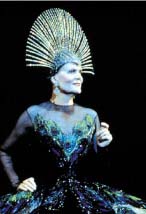|
Millennial Marty
James Jorden: The first time I heard you here in New York was The Bassarids of Henze... Anja Silja: Yes, that was about ten years ago, with the Cleveland Orchestra.
How nice! Thank you. Actually I don't remember the music either. I will be doing that piece again soon and I will have to learn it again. For a long time, The Makropulos Case was a rarity, and now, it's almost a standard repertory work. What do think accounts for this change in the public's taste? This may sound a little strange to say, but I think I did a lot to make this opera popular. I have sung it now for 30 years, beginning in 1970, then again ten years later, and then a few years ago the very successful production in Glyndebourne. Since that time I have sung it in many places. The Glyndebourne is a wonderful production dramatically and I think that did a lot to make the opera better known to the public. It's an opera that is very difficult to cast, you know. Without the right person for the main role, I am afraid the opera will fall back into anonymity. What sort of artist is needed to interpret Emila Marty? One has to have had a whole lifetime behind her to sing that opera properly. As I said, I sang it first about 30 years ago, and at that time I had great fun in this role, but the performance really had nothing to do with the real meaning of what the opera is about. You need a lifetime, and a very specific kind of lifetime at that. It's not enough to have been around for a while; you also must know that feeling of being tired of life, not having roots, not wanting to go on and having no real joy in life. This is something most performers don't really understand; most of us today want to stay young and desirable. The real theme of Makropulos Case, I think, is just being tired of life, and specifically being misunderstood by other people. I really think Janacek knew this feeling of being misunderstood; he was not recognized during his lifetime and even today, he is not a popular composer. So he had this quality of being a stranger in the world, of standing outside the world. He was unique in his time, and is so even today, in the truth and honesty of his music.
I am afraid so. I personally cannot imagine what it would be like to live even a few years longer than we already live, so three or four hundred years I think would be miserable. Already these days it's difficult to build a relationship that lasts for more than five years. But imagine a couple trying to stay together for a century -- that cannot work! So extending life that way, for centuries, cannot be worthwhile. Actually, that's just what Marty says in the opera: life is not meant to go on so long. You get sarcastic, you get tired and angry. Emilia Marty's career lasted for over three centuries, but you almost rival that, since you have been singing for 40 years... No, 50 years now! I started as a child prodigy, and I have everything from Queen of the Night until, just recently, Klytemnestra -- a really wide range. All I am missing is the masculine parts! You seem to be a living argument against the Fach system. Fach, I think, doesn't exist. What does exist is the character of a role. For instance, the character of Isolde is just a young girl who thinks she is in love. Wagner himself wrote that Isolde is a child playing with a sword, a child who is angry that she doesn't get what she wants -- almost the story of Salome! She is not a mature, loving woman, just a girl. And Tristan is a child as well. But it is never done this way. Always we hear these huge voices, not to mention huge figures! But if Tristan and Isolde are middle-aged, what is Koenig Marke, then, is he ninety years old? Unfortunately Wagner wrote for a huge orchestra, but you can still express that young character with a conductor who helps you, who has them play in a more chamber music style, as Karajan did at the beginning at Salzburg. Unfortunately the theater at Salzburg is not at all friendly to voices, but Bayreuth is very friendly. When I sang the Wagner parts at Bayreuth, Wieland Wagner was very particular about choosing conductors who would "save my life." What made Wieland Wagner so different from other impresarios and other stage directors? What made Mozart stand out from other composers? He was a genius, and he created something that all other composers could imitate and follow. Of course Wieland Wagner would never have compared himself to Mozart, but he was a genius as a stage director. And now two generations have followed him, sometimes not even knowing that their work is based on Wieland Wagner's ideas. He conceived the idea of maintaining a huge distance between the singers, with very little movement, and yet with a sense of connection between them. He had a magnificent sense of proportion, as in a painting, each figure exactly placed in the composition. So radical a change in stage direction must have been very difficult for you as a singer.
Every singer found his methods difficult to understand at first. But over the years we worked together on over 30 productions in that short time before he died. He was loyal to the singers he believed in and used them over and over. For me it was not so difficult; I suppose I was just the right medium for his ideas. I am an exception in that. It was a marriage made in heaven to find each other, and I could really bring onto the stage what he had in mind. But most singers found it difficult to stand still for fifteen minutes at a time, or to stand on stage turning their back on the public -- because it had to be a meaningful back! Do you have any ambitions to be a stage director yourself? Or do you want to teach master classes? That sounds so pretentious; even that name, "master class" sounds so wrong. Does that mean we should consider ourselves "masters" of what we do? We are singers, some better than others, some less good, but I am not a master of anything! Now, I would be willing to help singers to understand the drama of a piece, with the pronunciation and the meaning of the words. That might interest me. But not singing lessons or master classes. When I watch Elisabeth Schwarzkopf's teaching, when I see her interrupting the singers after every second note -- that's absolutely ridiculous, especially when you listen to her last recordings, which are awful! Nobody dares to criticize the great Schwarzkopf, but it's ridiculous, how can she do that? I hate that attitude: just because one is old doesn't mean that one can do whatever one wants. That's the theme of Makropulos Case, isn't it? Yes, that's right. She behaves so strangely because she knows she has this knowledge of hundreds of years, but no one will believe her. No one understands her, and that makes her angry. We all get more impatient with other people as we get older, so you can imagine, after all those centuries! But Emila Marty was a great diva too. Isn't that an important part of the character? I think Janacek wrote Marty as a glamorous figure to show how much people look only at the surface, like a mask. The public can accept the egomania of her personality because they see her as a larger than life theater personality. But deep inside all that the glamour is perfectly meaningless. Inside she is someone totally empty and sad. You see that in the final scene, when I am in that simple black dress, very plain. That idea developed during rehearsals, to have no wig, almost no makeup. In earlier productions, one tried to transform Marty visually into an old woman, even to have her dissolve away like Dracula, but that was really a little ridiculous. It's more honest to have her die as a real woman.
You also bring a lot of humor to the character of Marty. In all parts you can find a humorous side. Herodias is another example. She is obsessed with the idea that everyone should recognize her, everyone should be on their knees. She becomes ridiculous because of her obsession to manipulate everyone around her. The only one she fears is Jokanaan because his belief is so strong she cannot dominate him. He doesn't need her. So I try to express that aspect of her character, because otherwise she is the least interesting character I have ever done -- she just enters, and she is, and she leaves, and she never changes. Therefore one tries to show something of her history, to demonstrate why she should have influenced Salome's character. Salome, another of your great roles. I wonder, is there any part you wanted to sing but missed? I wish I had some desires still left, but there are so few things I haven't done. One role I didn't do because of the death of Wieland Wagner is Kundry. I now regret that I didn't do the part anyway, but for a long time I never really liked her. I always thought, this role is ridiculous. In the first act she is screaming and then she sings in the second act and then in the last act she only says one word. What is this? There is no beginning, no end ... this is not for me. But in the last couple of years I have started to understand that role. The meaning of Kundry's silence is so strong to me now. And understanding a role is so important. I never chose a role because of the beauty of the singing phrases. Opera shouldn't be like that, though very often it is, just beautiful sound. But drama in general is not beautiful. We see this some now on television, on some of the crime dramas, that some of it is ugly. And it should be the same way with opera, it should not be constantly beautiful. If you listen to violinists or cellists nowadays, you can hear how the style has changed. Fifty years ago, they played everything with beauty, but now, they let you hear some of the scratching, the noise. This is how it should be with a voice. You have to have the courage to sing some ugly tones to make clear the meaning.
|
|||||
|
|
|||||
 I
am ashamed to say I do not remember the music well at all, but I do
remember as if it were yesterday how elegant you looked -- a very
simple black dress and a string of baroque pearls.
I
am ashamed to say I do not remember the music well at all, but I do
remember as if it were yesterday how elegant you looked -- a very
simple black dress and a string of baroque pearls. Every
day you read in the newspaper about some medical advance that promises
to extend human life. But will this just make us all as unhappy as
Emila Marty?
Every
day you read in the newspaper about some medical advance that promises
to extend human life. But will this just make us all as unhappy as
Emila Marty?